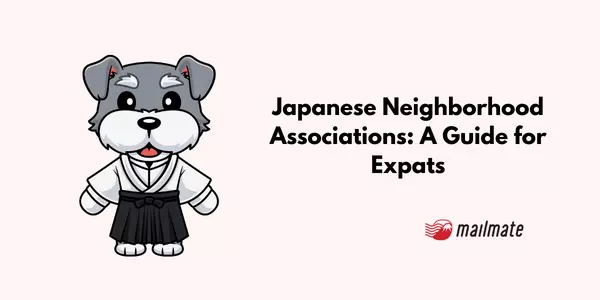Japanese Neighborhood Associations: A Guide for Expats

Buying property or moving to Japan for the foreseeable future? What should you know about neighborhood associations in Japan?
We cover the pros and cons of jichikai, what to consider if your house or an apartment has a neighborhood association in the area, and your rights as a renter or property owner.
An overview of neighborhood associations in Japan
In Japanese, neighborhood associations are known as chounaikai (町内会) or jichikai (自治会). These resident-run voluntary organizations aim to improve the lives of the residents within their designated community.
Historically, Japan’s neighborhood associations have roots in Japan’s wartime past and played such roles as air raid damage control. After the war, chounaikai activities were banned on the grounds that they provided grassroots support for the war effort. In 1952, the ban was lifted, and neighborhood associations were once again allowed.
In a 2017 book on the topic of Japan’s neighborhood associations, author Minoru Nakata proposes the following five characteristics of neighborhood associations in Japan.
The association is divided into certain areas, and these areas do not overlap each other.
The association is composed of households as a unit.
In principle, all households (units) are considered to be members.
They are involved in various local issues in a comprehensive manner.
Thus, the association represents the community to the government and outside third parties.
If you are a resident of an area with a neighborhood association, you will be asked to join and pay a monthly membership fee. Activities are funded through monthly membership fees (between ¥300 and ¥600) and through fundraising activities conducted by the neighborhood association.
What’s the difference between chounaikai and jichikai?
The names for neighborhood associations in Japan differ from area to area but this does not change the general purpose nor makeup of these associations. According to a 2003 survey by the Ministry of Internal Affairs and Communications, the majority of neighborhood associations (at 42.8%) referred to themselves as jichikai. Chounaikai came in second place (24.6%).
What type of activities do neighborhood associations in Japan perform?
Activities are self-selected, so the actions of each neighborhood association in Japan will differ from place to place. In general, however, activities are related to crime prevention, fire prevention, traffic safety, disaster prevention, cleaning of garbage disposal locations, fundraising for maintenance costs, maintenance of security lights, hosting festivals, and various recreational activities.
On a more visible basis, individuals residing in an area with an active chounaikai or jichikai will see a clipboard (回覧板 = kairanban) visit their mailbox periodically. The kairanban circulates through all the houses on a street, passing on local news and information.
According to Minato City (Japanese guidebook), the neighborhood associations within Minato conduct the following activities throughout the year for their communities:
Crime prevention patrol
Cleaning activities
Cleaning of graffiti
Celebration of school enrollment
Sakura viewing
Spring traffic safety awareness activities
Barbecues
Flea markets
Summer festivals
Calisthenics
Bathing and hiking activities
Fall traffic safety awareness activities
Respect for the elderly celebrations
Disaster preparedness training
Christmas parties
Mochi-making parties
Setsubun celebrations
Coming of age celebrations

What are the pros to joining a neighborhood association in Japan?
What are the general activities of a neighborhood association and what are the benefits of joining a jichikai?
1. Integration with your local community.
As a member of a neighborhood association, you will receive information about community events and invitations to participate in a variety of activities that serve to strengthen community bonds. If you plan to live in an area for many years, joining a neighborhood association provides an opportunity to integrate with your neighbors.
2. Disaster relief preparedness and training.
Many neighborhood associations run evacuation and disaster preparedness drills where citizens go through the motions of enacting what to do in case of a natural disaster. Additionally, because neighborhood associations serve as a united voice, they are able to represent their members’ request concerning infrastructure requests.
3. Events and support for families with children.
Many neighborhoods in Japan have children's associations. In some cases, the children's association is run by the neighborhood association. Children’s associations are responsible to host events that the children in the community can enjoy. In many areas, the children's association will also organize morning calisthenics during summer vacation.
4. Activities that enhance community safety.
Neighborhood associations also engage in activities to improve public safety in the community, for example, by patrolling at night, watching over children's paths to school, cleaning up neighborhood streets, cleaning and maintenance of garbage disposal locations, requesting the installation of exterior lights, and installing warning signs.
What are the cons to joining a neighborhood association in Japan?
Home owners and renters might have reservations about joining a neighborhood association in Japan because of the time and labor commitments involved. When you join a neighborhood association, you are not only required to pay neighborhood association dues, but you may be asked to volunteer or participate in various activities and events. You may also be put on the rotational for cleaning your street’s garbage collection station.
See also: Homeowners Association in Japan: A Guide for Property Owners
Can I still use the garbage disposal station if I haven’t joined a neighborhood association?
Opposing opinions abound. While the local municipality is officially responsible for disposing of household garbage, neighborhood associations in Japan take charge of the cleaning and maintenance of garbage collection points. The association may have rules that prohibit non-members from using their garbage site, in which case, you will need to ask for permission from your neighborhood association. Some neighborhood associations allow residents to be part of the cleaning rotational without joining the neighborhood association itself.
Contact your city office to find out the point of contact for the neighborhood association that exists for your area and then ask what the particulars are for using the garbage collection station without joining the neighborhood association.
In certain circumstances, you can request for the issuance of an additional garbage collection station. The guidelines for designating new garbage collection stations differ from city to city. Google [your city] + ごみステーションの設置届け.
Does my apartment belong to a neighborhood association?
If you are a renter in Japan, you can ask your landlord if your apartment belongs to a neighborhood association. It could be that your landlord pays any association-related fees and serves as the point of contact with your association.
If you are an apartment owner in Japan, you will mandatorily be a part of a Building Management Association (マンション管理組合), which consists of all unit owners. This association meets regularly on topics related to the building’s management. Being a member of a Building Management Association is mandatory for apartment owners in Japan. However, being a member of a neighborhood association in Japan is not mandatory by law.
Frequently asked questions
What's the meaning of jichikai?
Jichikai refers to a local neighborhood association in Japan.
What's the difference between chounaikai and jichikai?
Chounaikai and jichikai both refer to neighborhood associations in Japan. The names for neighborhood associations in Japan differ from area to area but this does not change the general purpose nor makeup of these associations.
What type of activities do neighborhood associations in Japan perform?
Activities are self-selected, so the actions of each neighborhood association in Japan will differ from place to place. In general, however, activities are related to crime prevention, fire prevention, traffic safety, disaster prevention, cleaning of garbage disposal locations, fundraising for maintenance costs, maintenance of security lights, hosting festivals, and various recreational activities.
What is a typical Japanese neighborhood like?
A typical Japanese neighborhood will depend on whether the neighborhood is located in the countryside on within a suburban area. In the countryside, houses tend toward single detached housing. Whereas in the city, you will have a mix of apartment buildings and single housing units.
What's the safety like in Japanese neighborhoods?
Japanese neighborhoods are generally considered safe. However, the crime rate tends to be slightly higher in city areas than in the countryside.
How is public transportation in Japanese neighborhoods?
Public transportation in Japanese neighborhoods consists of buses and trains that are generally punctual and widely used among Japanese commuters.
In closing
If you are moving to Tokyo or anywhere in Japan and need help settling in, consider using MailMate's bilingual virtual mail service to help you navigate language barriers and ease your transition.
Virtual mail users get exclusive access to MailMate's bilingual concierge service.
Spending too long figuring out your Japanese mail?
Virtual mail + translation services start at 3800 per month. 30-day money-back guarantee.

